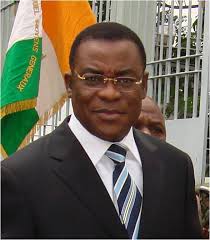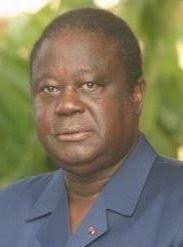


The two leading opposition candidates in Ivory Coast’s October 31 presidential vote on Thursday asked their supporters to actively boycott the electoral process as the West African nation officially began its 2020 presidential campaign.
“The electoral process under way does not concern us… we ask our supporters for an active boycott through all legal means,” former prime minister Pascal Affi N’Guessan told reporters in a joint appearance with another leading opposition candidate, former president Henri Konan Bedie.
They did not say whether they would pull out of the election.
The vote has sparked tensions in Ivory Coast as incumbent President Alassane Ouattara seeks a controversial third term, prompting fears of violence.
Affi N’Guessan asked supporters to “refrain from participating, both with regards to the distribution of voter registration cards and with regards to the electoral campaign”.
He also called for them to “block the electoral coup that President Alassane Ouattara is preparing”, and “to prevent any operation linked to the ballot from being held”.
Neither opposition candidate took questions, promising to hold a press conference on Friday.
The announcement came as the cocoa-rich West African nation began the campaign for the October 31 presidential election.
Many observers fear a pre- or post-election crisis comparable to that in 2010-2011 when 3,000 people died and the West African nation was plunged into chaos.
“All the Ivorian opposition says No, No, No,” to a third Ouattara mandate, was the message displayed at an opposition rally in Abidjan on Sunday that attracted tens of thousands of people.
There are four candidates in the running – 78-year-old Ouattara, Bedie (86), Affi N’Guessan and former parliamentarian Kouadio Konan Bertin.
Soro awaits ICC ruling
The country’s constitutional council rejected a further 40 would-be candidates including former president Laurent Gbagbo, 75, and former rebel leader Guillaume Soro, 47, both of whom played key roles in the crisis that engulfed the country after disputed elections in 2010.
Gbagbo was freed conditionally by the International Criminal Court (ICC) in The Hague after being cleared in January 2019 of crimes against humanity.
He is currently in Brussels pending the outcome of an appeal against the ICC ruling.
The opposition has cried foul over Ouattara’s attempt to secure a third term in office despite the two-term constitutional limit.
After his re-election in 2015, Ouattara announced in March that he would not seek a third term.
But he changed his mind after his preferred successor, prime minister Amadou Gon Coulibaly, died of a sudden heart attack in July.
Ouattara and his supporters have argued that a 2016 revision of the constitution reset the limit on the number of terms.
Violent demonstrations
Demonstrations against Ouattara’s decision to run again have turned violent and left around 15 people dead, reviving memories of the murderous crisis a decade ago.
Several high-profile figures, including Konan Bedie and former prime minister Affi N’Guessan, have called for “civil disobedience” in recent weeks.
During the campaign, Ouattara is expected to point to his “excellent” record on the economy and the positioning of Ivory Coast – the world’s biggest exporter of cocoa – as a regional powerhouse.
He is promising a better distribution of growth to the country’s poorest and most remote areas.
“This election will not be credible,” said former Foreign Minister Marcel Amon-Tanoh, a former Ouattara loyalist.
Turnout among the 7.5 million people entitled to vote in a country with a total population of 25 million will be a key point.
Observers fear a high abstention rate in a country with a median age of 18.7 for an election in which the two main contenders have been on the political scene for 30 years.
Last week, a delegation of African and UN envoys expressed “deep concern” ahead of the vote.
Last month, the International Crisis Group called for a postponement and suggested political exiles be allowed to return to Ivory Coast.
(FRANCE 24 with AFP)


